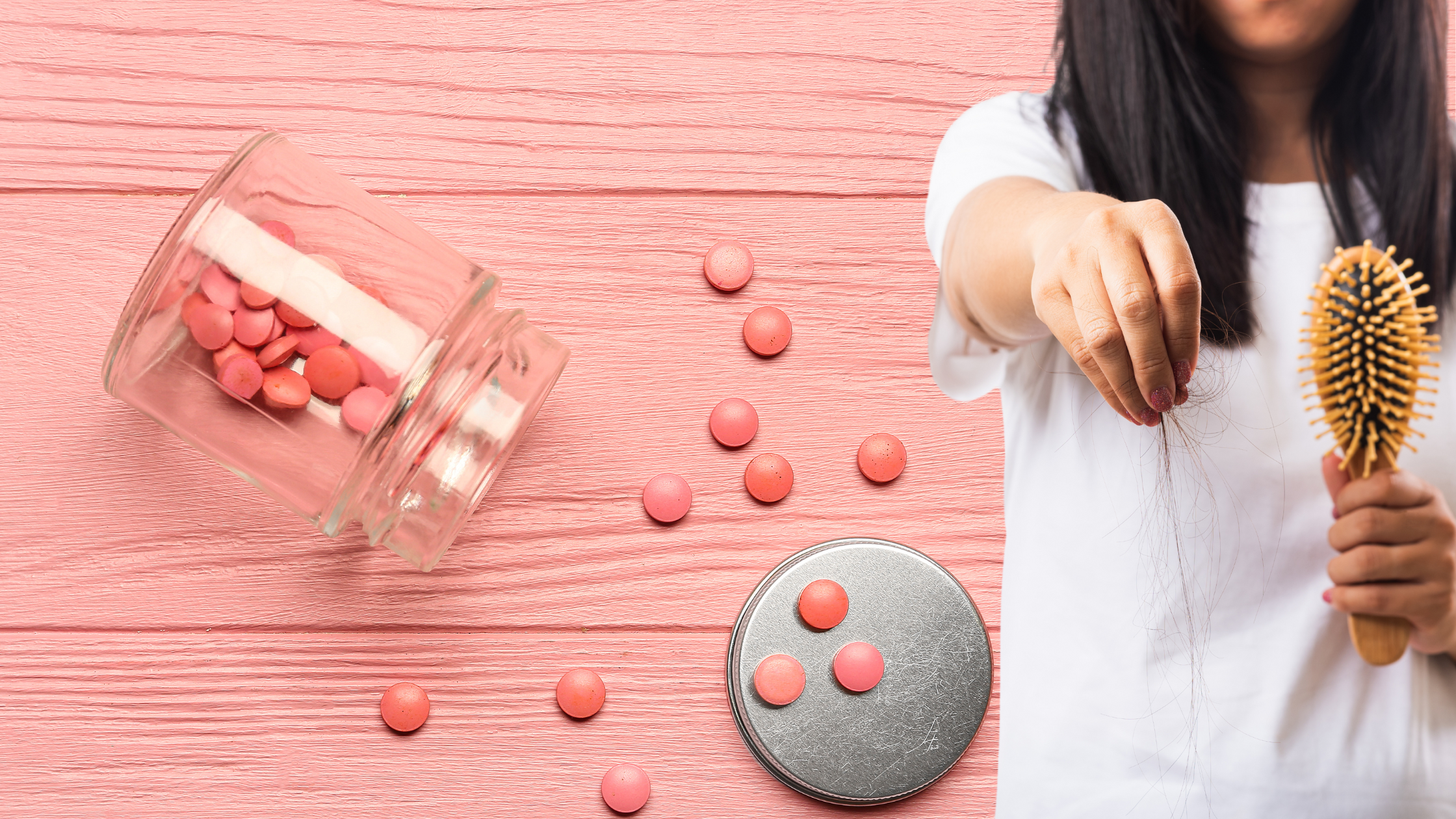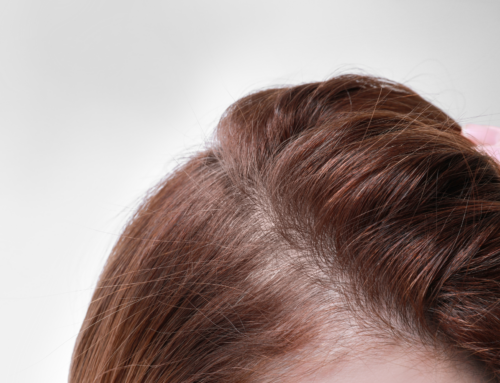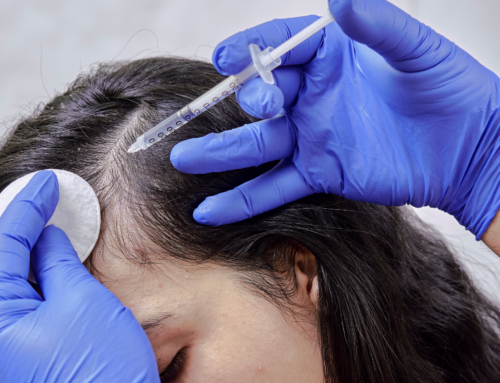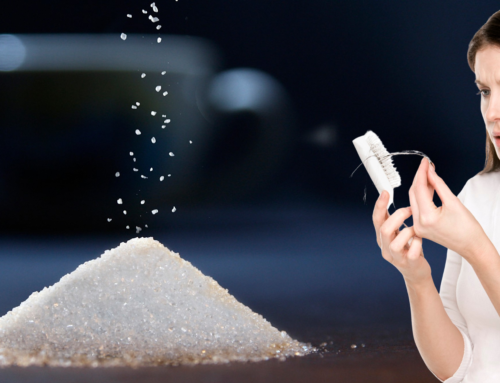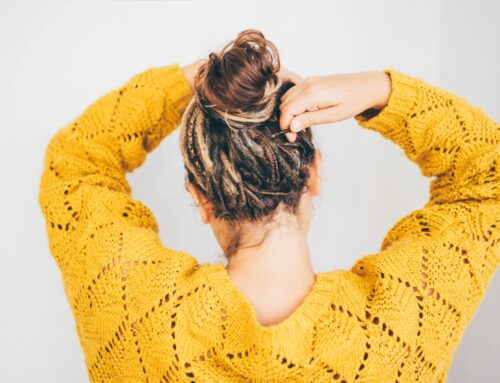Hair Loss due to Hormones
Hair loss due to hormones is one of the most common causes of female hair loss. It’s the body’s way of saying you’re out off balance.
Your hormones are a complex, delicate dance of chemistry, and when they’re out of sync, it affects your whole system. There are many hormones that impact your hair growth, density and strength, and they’re key to keeping your body and hair healthy.
A slight change or hormonal imbalance can wreak havoc on your endocrine system and hair, along with your emotions!
If we look at the hair follicles, located in the second layer of skin (deep dermis) they are directly influenced by a group of hormones that are abie to reshape, resize and determine the lifespan of your hair follicles.
When the follicles are acted upon by certain androgens and hormones, it can create a disruption in the follicle, resulting in thinning, shedding, and loss. It can lead to dry, brittle hair, oily hair… even premature graying1
Let’s take a look at the three most common hair loss conditions linked to hormonal imbalances:
- Telogen Effluvium
Telogen effluvium (TE) is a form of non-scarring alopecia that presents as chronic, premature hair shedding of hair that is in the telogen (resting phase). It occurs after some metabolic stress or hormonal change. This loss is common with thyroid conditions. 50% of people with hyper (overactive) thyroidism deal with TE, as do 33% of folks with hypo (underactive) thyroidism.
In people with diabetes we see intelligent effluvium. It happens when the pancreas can’t make enough insulin to maintain normal blood glucose (sugar) levels. When blood sugar levels remain too high, they cause damage to tissues, organs and vessels, leading to hair loss over time.
- Androgenic (Androgenetic) Alopecia
Although AGA can occur early in a woman’s life (20’s), it generally is more common during menopause. One cause may be the changing levels of hormones, when the estrogen and progesterone – two hormones critical for hair growth – decrease. Making things worse, the decrease in these “hair promoting” hormones occurs at the same time the androgen (testosterone) levels increase.
These androgens trigger follicle miniaturization in the scalp, and over time the hair becomes finer, more brittle and vulnerable to damage.
- Alopecia Areata
Alopecia areata (AA), is caused by an imbalanced immune system and usually occurs with diseases like rheumatoid arthritis, asthma, hay fever, even thyroid disease. It happens when your immune system mistakes a part of your body as a foreign invader. It then turns on itself to get rid of the “invasion,” by attacking the hair follicles.
This type of hair loss presents as patchy spots on the scalp and other parts of the body and may include the nails. Some people might be more genetically predisposed to AA.
Each of these hormone related conditions have different causes and symptoms, and specific patterns of thinning or loss, so it’s important to know what you’re dealing with before treating hair loss due to hormones.
Is hormonal hair loss reversible?
Hormonal hair loss is absolutely reversible, so don’t despair!
Staying calm and reducing stress is extremely important when it comes to hormone related hair loss, so keep things in perspective and find ways to stay positive. In most cases, we’re able to regain the hair that was lost. With the right approach, you’ll find hormonal hair loss is reversible.
How long does hormonal hair loss last?
Once the equilibrium is restored to your body and your hormones, your hair loss should slow or cease within 3-6 months.
In some cases, regrowth may take up to two years, depending on the medical diagnosis, and the treatment protocols.
There are many things you can do at home to support your hair and body with hormone related hair loss. I suggest you try non-invasive, plant-based and toxin-free before resorting to harsh treatments that may affect your system. I’ll discuss those options in a moment.
How do you fix hormonal imbalance hair loss?
Hormonal imbalance related hair loss can be tricky, and you’ll need patience. I recommend taking a natural, multi-pronged approach to restore balance to the body, which includes consulting with a trichologist or doctor. Consider getting lab tests on a consistent basis to track your progress.
You may need to develop some new habits, such as eating healthier through an auto-immune based food plan, and changing or increasing your exercise routine. You’ll need to reduce extra stress and find some simple stress reduction techniques. All these habits can help to get your hormone levels back on track.
Here are a few specific tips to fix hormonal imbalance hair loss.
Eat essential fatty acids
Eat essential fatty acids, especially as much high-quality, fresh fish as possible. Healthy, non-GMO, line caught fish is best, and be sure to eat the skin! Try fish like salmon, tuna (mercury-free), mackerel, sea bass, shrimp and sardines packed extra-virgin olive oil are great for the hair. High-quality omega 3 oils, flaxseed or flaxseed oil, and nuts like walnuts or almonds are good sources of supplementation.
Studies show that a six-month supplementation with specific omega 3’s, 6’s and antioxidants were able to protect against hair loss and improve density. It also reduced miniaturized hairs.
Stop stressing
Stress can absolutely impact and make hair loss worse, so you have to find ways to maintain your calm, whether it’s prayer, meditation, deep breathing, or EFT. Make these practices a part of your daily routine. Not only are they good for your hair, they’ll help restore and calm your cortical levels.
Monitor your iron levels
Iron deficiencies in women are often linked to hair loss. Iron supplementation may be helpful. If you’re low in iron, a supplement can’t hurt you.
Get moving
Whether it’s walking, tai chi, cycling or weight lifting, getting physical exercise on the daily will help alleviate stress.
If you can get outside to exercise, all the better, as it will increase your Vitamin D levels at the same time. Vitamin D deficiencies also play a part in hair loss issues.
Try a natural solution
Try a natural solution for your hormone related hair loss. Cellustrious® approaches it with a plant-based peptide system to stop hair loss. Our home kit includes a topical peptide serum which is applied with a dermastamp, along with a botanical shampoo and leave-in conditioner (to reduce fallout) and our plant-based peptide nutraceutical backed by clinical trials. It contains AnaGainNu peptide, Biotin, Vitamins D, A, K, C, E, Zinc and a probiotic, to help improve scalp health, DHT inhibition, and the support of healthy hair.
It’s important not to overload your system, which is why we take a natural approach to treating hormonal and menopausal hair loss. It takes patience because it can be months before results are visible. The more persistent you are with any home treatment, the better your results will be.
Avoid heat styling
Exposing your hair to a lot of heating tools can create inflammation – which is not good for the scalp. And pulling and tugging at your hair can make the already weak hair follicles prone to breakage, which makes thinning hair look even worse.
Check your meds
You may be taking medications that exacerbate hair loss. If this is a concern, create a list with all of the medicine names/brands, dosage amounts and timelines, along with any supplements you’re taking.
Make an appointment to see a trichologist (hair loss professional), functional medicine doctor, or other medical professional to discuss your hair loss, and bring your list, to share with them about. It could be that your medicine is directly linked to hair loss.
Hormonal conditions and disorders are complex. The treatment may require several professionals working together to establish the right plan and protocol to fix hormonal imbalance hair loss.
Trichologist Recommended
Trichologist recommended options usually include working from the inside out. Meaning, balancing the hormones and body through non-surgical, non-toxic options, including the list of things we presented early in this article.
At Cellustrious®, we explore methods of reactivating the affected follicles linked to hormonal imbalances, including menopause and post-menopausal hair loss.
If you’re suffering from hormonal hair loss, book a telehealth consultation with, trichologist Misti Barnes.
If you’re in the Sarasota or Bradenton area, contact us for a face-to-face consultation at our office by calling (941) 909-7701.

